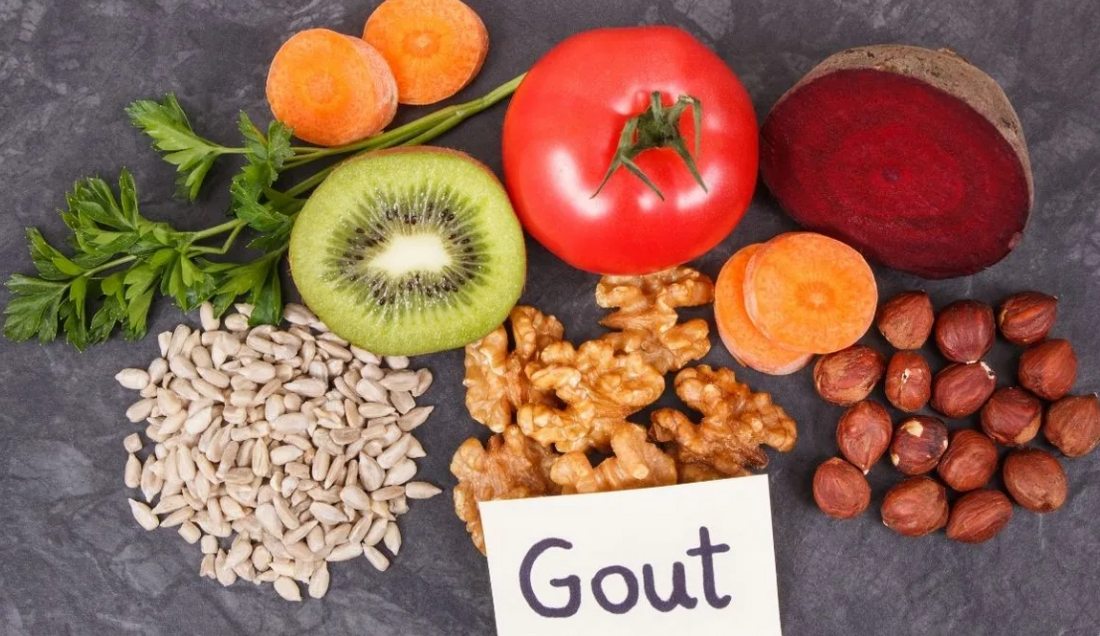
Treat Uric acid through Food and Supplements
Share

Addressing uric acid levels through dietary modifications and supplements is a cornerstone of managing conditions like gout and hyperuricemia. A carefully curated diet not only helps alleviate symptoms but also plays a crucial role in preventing flare-ups and promoting overall well-being. By understanding how certain foods can either exacerbate or alleviate uric acid levels, individuals can empower themselves to make informed dietary choices that support optimal health. This guide explores the transformative power of a well-balanced diet in managing uric acid levels, offering insights into the key principles and food choices that contribute to a healthier and more vibrant life.
-
Stay Hydrated: Drink plenty of water throughout the day to help flush out excess uric acid from your body.
-
Limit Purine-Rich Foods: Purines are natural substances found in certain foods that can contribute to higher uric acid levels. Limit intake of foods high in purines such as red meat, organ meats (liver, kidney), shellfish, and certain types of fish (anchovies, sardines, mackerel).




8. Moderate Portion Sizes: Overeating, especially high-purine foods, can contribute to elevated uric acid levels. Practice portion control and aim for balanced meals.
9. Consider Vitamin C-Rich Foods: Some studies suggest that vitamin C may help lower uric acid levels. Include foods rich in vitamin C such as citrus fruits, strawberries, bell peppers, and broccoli in your diet.

10. Ginger: Including ginger in your diet or drinking ginger tea can help reduce gout-related inflammation and lower uric acid levels due to its anti-inflammatory properties.
11. Turmeric: Using turmeric in cooking or taking turmeric supplements can help lower uric acid levels due to the anti-inflammatory properties of curcumin, the active compound in turmeric

12. Nettle Leaf, Dandelion Root, and Celery Seed: These herbs have been traditionally used to support kidney function and reduce uric acid levels. Consulting with a healthcare professional before using herbal remedies is recommended.

13. Low-Fat Dairy Products: Consuming low-fat dairy products, peanut butter, and most nuts can help lower uric acid levels.
14. Supplements : Supplements can play a supportive role in controlling uric acid levels, especially when combined with dietary modifications and lifestyle changes for example Vitamin C, Black Cheery, Milk thistle, Phyllanthus Niruri, Cellery seed extract,curcumin 95 etc
Foods to Avoid:
1. Alcohol: Minimizing alcohol consumption is essential, as it has a high content of purines that can increase inflammation in the body.
2. Sugary Foods and Beverages: Avoiding sugary foods and beverages, including fruit juices and sweetened sodas, is crucial, as they can trigger gout attacks and raise uric acid levels.
3. Meat, Poultry, and Seafood: Limiting the consumption of meat, poultry, and seafood is recommended, as they are major sources of protein and can raise uric acid levels.

4. Pulses: Pulses have a high content of purines and should be restricted to avoid gout attacks.
5. Refined Carbohydrates: Refined carbohydrates, such as bread, cakes, and cookies, can raise uric acid levels and should be avoided.

6. High-Fat Foods: High-fat foods, including bacon, dairy products, and red meat, should be limited, as they can raise uric acid levels.
7. Organ Meats: Organ meats, such as liver and sweetbreads, are high in purines and should be avoided.
8. Some Fish and Seafood: Certain fish and seafood, such as trout, tuna, haddock, sardines, anchovies, mussels, and herring, are high in purines and should be limited.
9. Sugary Beverages: Avoiding sugary beverages, including soft drinks, is essential, as they contain fructose, which can lead to high uric acid levels
Conclusion
Adopting a natural approach like dietary and through supplements to managing uric acid levels is a fundamental strategy for individuals dealing with conditions like gout and hyperuricemia. By making thoughtful choices about what we eat and drink, we can positively impact our overall health and well-being. Incorporating habits such as staying hydrated, limiting purine-rich foods and alcohol consumption, prioritizing nutrient-rich options like low-fat dairy, complex carbohydrates, and plant-based proteins and through supplements which may contain anti-inflammatory ingredients like ginger, turmeric, and many other herbal ingredients which may provide additional support in managing inflammation and uric acid levels. can help support optimal uric acid levels and also serves as a foundation for long-term wellness.

